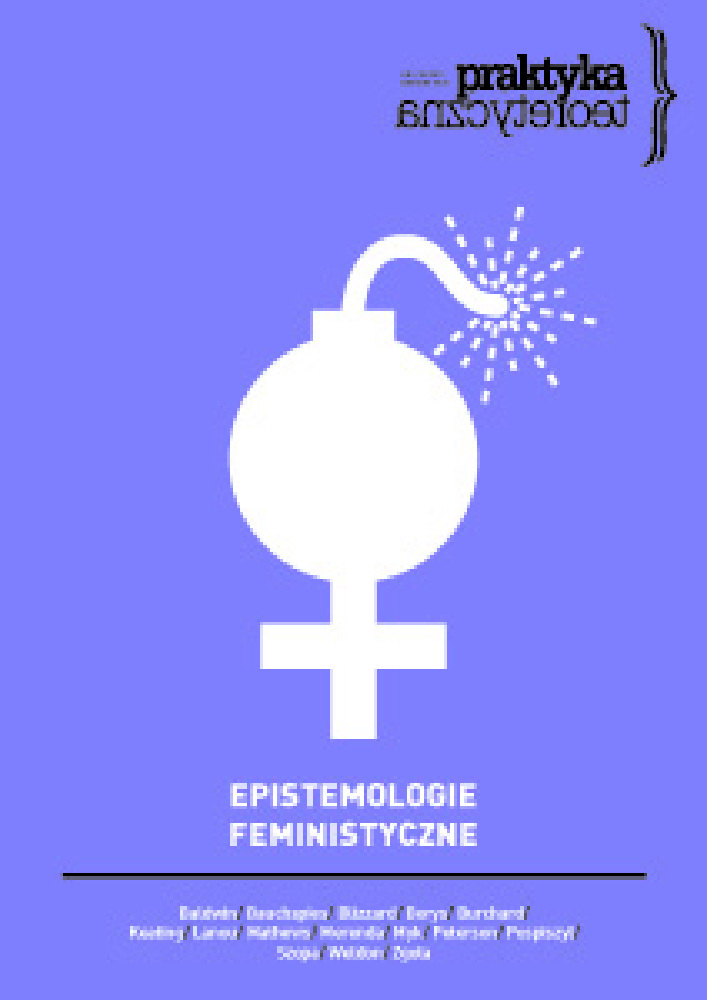Abstrakt
W niniejszym artykule problematyzujemy etap stabilizacji w procesie badań w terenie i pisania etnografii z perspektywy feministycznej. Rozpoczynamy od postawienia następującego pytania: w jaki sposób badaczki z zakresu feministycznych badań nad nauką godzą normatywną potrzebę stabilizacji naszego obszaru badawczego z tworzeniem wiedzy w obrębie ruchomego podłoża „roszczeń do prawdy”, uznawanego i dokumentowanego przez praktyki feministyczne? Centralną kwestią tego artykułu jest refleksja nad naszymi doświadczeniami jako feministycznych teoretyczek, nauczycielek i etnografek prowadzących badania nad ciążami wysokiego ryzyka w krajach rozwiniętych, szczególnie w Stanach Zjednoczonych, oraz nad gender i codziennymi technologiami w Zachodniej Afryce. Naszym celem jest teoretyzowanie tej niestabilności w celu podkreślenia ograniczeń i korzyści pracowania ze świadomością i refleksyjnością w kontekstach społecznych przy jednoczesnym rzucaniu wyzwań i wzbogacaniu energii naszych feministycznych teorii i praktyki.
Bibliografia
Agar, M. 1980. The Professional Stranger. New York.
Barbercheck, M. 2001. ,,Mixed Messages: Men and Women in Advertisements in Science.” in Women, Science, and Technology: A Reader in Feminist Science Studies, ed. M. Wyer et al. New York.
Bauchspies, W.K., J. Croissant, S.P. Restivo, 2006. Science, Technology, and Society: A Sociological Approach. Malden.
Biagioli, M. 1999. The Science Studies Reader. New York.
Bijker, W.E., T. P. Hughes, T.J. Pinch 1987. The Social Construction of Technological Systems: New Directions in the Sociology and History of Technology. Cambridge.
Blizzard, D. 2007. Looking Within: The Sociocultural Construction of Fetoscopy. Cambridge.
Bowker, G.C., S.L. Star 1999. Sorting Things Out: Classification and Its Consequences. Cambridge.
Casper, M.J. 1998. The Making of the Unborn Patient a Social Anatomy of Fetal Surgery. New Brunswick.
Cole, C.M., et al., eds. 2007. Africa After Gender? Bloomington.
Crasnow, S. 2013. ,,Feminist Philosophy of Science: Values and Objectivity.” Philosophy Compass 4: 413–423.
DeVault, M.L. 1999. Liberating Method: Feminism and Social Research. Philadelphia.
Feyerabend, P. 1975. Against Method: Outline of an Anarchistic Theory of Knowledge. London.
Fleck, L. 1979. Genesis and Development of a Scientific Fact. Transl., ed. T.J. Trenn, R.K. Merton. Chicago.
Hale, C.R. 2006. ,,Activist Research vs. Cultural Critique: Indigenous Land Rights and the Contradictions of Politically Engaged Anthropology.” Cultural Anthropology 1: 96–120.
Harding, S.G. 1991. Whose Science? Whose Knowledge?: Thinking from Women's Lives. Ithaca, NY.
Harding, S.G. 2004. The Feminist Standpoint Theory Reader: Intellectual and Political Controversies. New York.
Hess, D.J. 1997. Science Studies: An Advanced Introduction. New York.
Landsman, G.H. 1998. ,,Reconstructing Motherhood in the Age of "Perfect" Babies: Mothers of Infants and Toddlers with Disabilities.” Signs 1: 69–99.
Layne, L.L. 1998. ,,Introduction.” Science, Technology, and Human Values 1: 4–23.
Layne, L.L. 1999. ,,'I remember the day I shopped for your layette': Consumer Goods, Fetuses, and Feminism in the Context of Pregnancy Loss.” in Fetal Subjects, Feminists Positions, eds. L.M. Morgan, M.W. Michaels. Philadelphia.
Lazreg, M. 2005. ,,Decolonizing Feminism.” in African Gender Studies: A Reader, ed. O. Oyéwùmí. New York.
Nader, L. 1969. ,,Up the Anthropologist-Perspectives Gained from Studying Up.” in Reinventing Anthropology, ed. D. Hymes. New York.
Nnaemeka, O. 2005. ,,Mapping African Feminisms.” in Readings in Gender in Africa, ed. A. Cornwall. Bloomington–Indianapolis.
Oyéwùmí, O. 2005. ,,Visualizing the Body: Western Theories and African Subjects.” in African Gender Studies: A Reader, ed. O. Oyéwùmí. New York.
Petchesky, R. 1987. ,,Fetal Images: The Power of Visual Culture in the Politics of Reproduction.” in Reproductive Technologies: Gender, Motherhood, and Medicine, ed. M. Stansworth. Minneapolis.
Rapp, R. 1999. Testing Women, Testing the Fetus: The Social Impact of Amniocentesis in America. New York.
Reinharz, S. 1992. Feminist Methods in Social Research. New York.
Schumacher, J.A. 1989. Human Posture: The Nature of Inquiry. Albany.
Sismondo, S. 2008. ,,Science and Technology Studies and An Engaged Program.” in: The Handbook of Science and Technology Studies, eds. E.J. Hackett, O. Amsterdamska, M. Lynch, J. Wajcman, Cambridge 2008.
Taylor, J.S. 1993. ,,The Public Fetus and the Family Car: From Abortion Politics to a Volvo Advertisement.” Science as Culture 4: 601–618.
Wittgenstein, L. 1953. Philosophical Investigations. Oxford.
Wylie, A. 2004. ,,Why Standpoint Matters.” in The Feminist Standpoint Theory Reader: Intellectual and Political Controversies, ed. S. Harding. New York.
Licencja
Autorzy:
„Praktyka Teoretyczna” jest pismem, które chce realizować idee wolnego dostępu do wiedzy i poszerzania domeny dobra wspólnego. Ma służyć rozwojowi nauki i krytycznej refleksji w Polsce i na świecie w imię idei wolnego dostępu do wiedzy (Open Access). Całe pismo jest udostępniane za darmo w Internecie na warunkach licencji CC-BY-NC-SA (Uznanie autorstwa-Użycie niekomercyjne-Na tych samych warunkach 4.0 Międzynarodowe) w wersji 4.0 (szczegółowe warunki: http://creativecommons.org/licenses/by-nc-sa/4.0/). Artykuły w nim zamieszczone mogą być dowolnie przechowywane, kopiowane, drukowane, rozpowszechniane i wykorzystywane do celów naukowo-dydaktycznych przy zachowaniu warunków licencji. Apelujemy tylko o uznanie autorstwa i podanie źródła w myśl przyjętych w środowisku naukowym standardów.
Nie ma natomiast możliwości komercyjnego wykorzystania zgromadzonych zasobów bez pisemnej zgody wydawcy. Dostęp do czasopisma nie może być dystrybuowany za opłatą czy w jakikolwiek inny sposób limitowany przez inne podmioty.
Autorzy tekstów przyjętych do publikacji w czasopiśmie „Praktyka Teoretyczna” są zobowiązani do wypełnienia, podpisania i odesłania na adres redakcji umowy o udzielenie nieodpłatnej licencji do utworów, z zobowiązaniem do udzielania sublicencji CC [PL.pdf, PL.doc, EN.pdf, EN.doc].
Zgodnie z umową, autorzy tekstów opublikowanych w czasopiśmie „Praktyka Teoretyczna” udzielają wydawcy czasopisma niewyłącznej i nieodpłatnej licencji oraz zezwalają na użycie sublicencji Creative Commons Uznanie autorstwa-Użycie niekomercyjne-Na tych samych warunkach 4.0 Międzynarodowe (CC-BY-NC-SA 4.0).
Autorzy zachowują prawa do dalszego, swobodnego rozporządzania utworem.
Autorzy nadsyłanych artykułów powinni upewnić się, czy wykorzystywane przez nich materiały nie są chronione prawami autorskimi na rzecz innych osób i ponoszą odpowiedzialność za ewentualne uchybienia w tym względzie.
